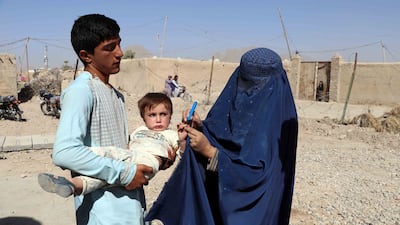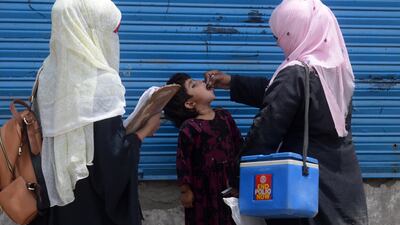About three months ago, Ahmad Zia’s family noticed that the boy of 2 was unable to move his legs.
Despite their concern, they were unable to take him to a doctor because of the fighting between Taliban militants and government forces in their district of Arghandab, in the southern Afghan province of Kandahar.
“For days on end there would be heavy fighting taking place here. There were regular bombings, air strikes, gunfire ... and anything else you can name. The situation was very tense,” Ahmad Gul, an uncle, said.
“The clinics in the district were also closed due to the fighting.”
When they finally managed to take the child to the Mirwais Hospital in Kandahar city, doctors told them the child had contracted polio, a crippling disease that has been eradicated from most countries but continues to be found in Afghanistan and Pakistan because of a lack of immunisation.
“Ahmad Zia was not vaccinated because we didn’t have access to doctors or clinics in Arghandab, and the vaccination team couldn’t get to us because of the security situation. Now our kid is affected for no fault of his,” Mr Gul said.
After years of progress in tackling the spread of polio, Afghanistan has seen a drastic surge in cases in the past two years, corresponding with the rise in violence and the global pandemic, both of which affected immunisation efforts.
Now that fighting has subsided after the Taliban seized power in August, the World Health Organisation and UN children's fund Unicef are hopeful of extending polio immunisation efforts to areas that were previously unreachable.
UN agencies announced on Monday that the Taliban had agreed to allow door-to-door visits by vaccination workers from next month.
The move was welcomed by the international community and healthcare experts.
“This is a unique opportunity. As you know, for three and half years the Taliban had banned house-to-house vaccination in areas that they control in Afghanistan,” said Dr Hamid Jafari, the WHO's director of polio eradication in the region.
In the past, Taliban fighters, suspicious of healthcare workers – who they who see as employees of foreign agencies working against them – not only attacked polio teams but also restricted access to areas under the control.
The number of polio cases rose from 19 in 2019 to 56 last year. So far this year, 44 polio cases have been detected.
Dr Jafari said that despite the increase, the actual level of transmission has been at the “lowest level” seen in years.
WHO's regional director of polio eradication
“There was only one case of the wild poliovirus in Afghanistan and one in Pakistan.
“The rest of the cases are ... an outbreak that started in Pakistan, which spread to Afghanistan. [This] circulates vaccine-derived polio, a variant which can emerge in under-immunised communities,” he explained.
“Epidemiologically, the situation is looking very promising. This is the time to seize the opportunity to maximise our probability of success,” Dr Jafari said.
“If we don’t resume vaccination now, I don’t know when such an opportunity will come again.”
However, fighting between the Taliban and former Afghan government was not the only security challenge the immunisation programme faced.
The local branch of ISIS has targeted female polio workers who make up most of the workers delivering vaccines.
“In Nangarhar province, the polio campaign was stopped after some of our colleagues were killed earlier this year. Many women workers left as there was no security for the campaign,” a female polio worker, who asked to be identified only as Munira, told The National.
Three women vaccinators were killed ISIS gunmen in the eastern province's capital, Jalalabad, in March, bringing the vaccination campaign there to a halt.
In June, five more people died in another attack on a polio team in the city.
female polio worker
Munira said the attacks on women vaccinators had set the polio eradication effort back by years in the eastern provinces.
“Women are crucial to running the polio campaign. They have access to communities and inside family homes even in the most conservative parts, where men would not be welcome due to the culture of gender segregation,” she said.
Munira said women are also better able to combat the vaccine hesitancy that exists in some communities as they have access to the children's mothers.
Acknowledging their role, the Taliban have encouraged the inclusion of women in the upcoming campaign and offered them security. But this might not be enough to convince volunteers to return, Munira said.
“There are still many problems. Right now, even if the nationwide campaign resumes, there might be risk to the people conducting the campaign and volunteers might not even participate because we have been attacked twice and we lost colleagues. We can’t ignore the security threat we still face from Daesh,” she said, using the local name for ISIS.
“I am here and I know many other women who have also returned to work, even though we haven’t been paid in seven months,” Munira said.
“We are doing this because we want to help the children of this country who have suffered a lot. But many others may not want to return.”








